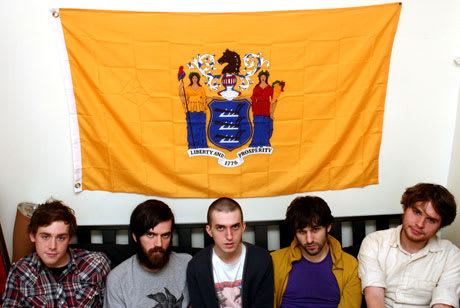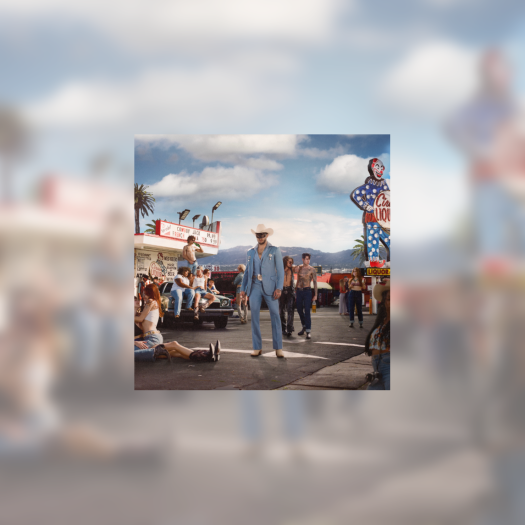Like their Shakespearean namesake, Glen Rock, New Jerseys Titus Andronicus are a dramatic bunch that play music so genuinely furious that it expels the sense that they too are out to taste the sweetness of revenge. Their recently released debut album, The Airing of Grievances, is a rock record with the kind of epic greatness you get to witness every time a blue moon hits. As gripping and ambitious an album as greats like Arcade Fires Funeral or TA favourite, In The Aeroplane Over The Sea by Neutral Milk Hotel, Grievances begins its arc with a celebratory "Fuck you! and never lets the listener go, keeping ears glued with their unrivalled ferocity. Virtual unknowns until just recently, the bands rise through blog love and word of mouth finds them becoming one of years best new discoveries. Bookish vocalist/guitarist Patrick Stickles and bassist Ian Graetzer took some time out to sit down and tell Exclaim! all there is to know about Titus Andronicus, from the literary references to the bands eternal instability.
Can you tell me a little about the bands history?
Stickles: The story of Titus Andronicus is not unlike that of any other band. Ian, Liam [Betson, guitarist], and I all come from the same small town in New Jersey, and I met Dan [Tews, guitarist/keyboardist] and Eric [Harm, drummer], who live in another small town in New Jersey, through mutual friends. We got started around the late spring of 2005 and have just been plugging away since then, playing all manner of embarrassing shows and wallowing in doubt and insecurity. Paying dues, I suppose. We just tried our best every time and hoped that somebody would notice. After a while, some people did not notice and told their buddies, and that process repeated enough times, and here we are.
You borrow both the name and text from Shakespeare's play. Was there intent behind those choices? If so, what are the reasons? As far as the name is concerned, it started out just as a cool-sounding name. I have found that when a person wants to be in a band, he or she spends a lot of time accumulating a mental file of words or phrases that would be cool band names. Titus Andronicus was, to my mind, the best one that Id come across. As we came to cultivate our aesthetic a little more, and understand more about the play, it became more and more appropriate. Shakespeare obviously is a very classy entity, more or less the pinnacle of human achievement and excellence. At the same time, The Most Lamentable Romaine Tragedy of Titus Andronicus is not really all that far removed from, say, The Texas Chainsaw Massacre so it was an odd contradiction in the literary world basically a generic slasher flick that happens to be the work of the greatest mind that ever walked the planet. That seemed like the kind of line that I wanted our band to straddle; that line between the more cerebral, thoughtful elements of the human condition and the part of us that just wants to see blood and brutality. If Titus Andronicus the play could have both those, I wanted Titus Andronicus the band to have them too.
As for the text, Titus Andronicus the play is basically a piece of crap, at least compared to the likes of Hamlet and Richard II, but I think that the monologue that we used (which was read beautifully by our old friend Doug Johnson, who moved to L.A. a while ago to be an actor) comes pretty close to redeeming the whole thing. It is very beautiful in its sheer wickedness and its lack of remorse. A very pure thing, you know? I wanted our album to have that same kind of attitude, that sort of take-no-prisoners thing.
And with Camus' The Stranger. What made you decide to use a selection of that prose?
The Stranger is probably still my favourite book, and the section that we used is probably the best part. Heart-breakingly beautiful stuff. In terms of relevance to the album, it was the same thought process I had in naming the song after Camus. The way that his protagonist, Mersault, is not necessarily an evil man but that the world has robbed him of any ability to feel anything, the end result of which is his doing evil things, affected me in a profound way. Being a bored teenager in New Jersey at the time when I first read that book, my friends and I spent a lot of our time knocking over trashcans and stuff like that, not out of any malevolence but just from sheer apathy and boredom. The Stranger was like the literary equivalent of the police blotter in the Glen Rock Gazette, to my mind. That idea of being generally an okay guy but having your environment turn you into an asshole was one of the central themes of our record. Also, I really wanted to have something for Okey Chenoweth to read, who was our high school drama teacher and is an amazing man.
There's an unmistakable sense of disgust, anger and/or frustration in the music and lyrics. Was The Airing of Grievances a cathartic experience for you? Is it what you'd consider an album full of venting?
It was not really a conscious decision to make a bunch of misanthropic, anti-everything songs. When it comes time to write lyrics, that is sort of just what comes out. There never seemed to be a good reason to sing about love or friendship or flowers or anything of that sort. That isnt to say that I dont have a good bit of that in my life. I have a very nice girlfriend and good buddies and everything, but those feelings never inspired the same sort of artistic impulse. Besides that, I wrote most of those songs at college, where I didnt have any friends and my girlfriend was 200 miles away and I was exposed to drunk frat boys calling each other faggots and grabbing girls asses on what seemed like an hourly basis, so I didnt have a very deep reservoir of good will to draw upon. All in all, I guess I am just a miserable bastard.
In the Aristotelian sense of "catharsis, I will say that I hate to imagine what kind of person I would be if I didnt get to scream my lungs out fairly regularly.
The album received what many consider to be the kiss of life from Pitchfork with a really favourable review. Has that opened some doors for you in the last couple weeks? I noticed you're playing the Pitchfork Music Festival, which will be the first opportunity I'll have to check you guys out (since I'm up in Toronto)...
Pitchforkmedia is a website that I have frequented for a number of years now, but only since they have smiled upon us have I come to understand the entirely unnatural power that they yield. To put it into perspective, our review went up on a Friday. On Thursday, we had 89 plays on MySpace. By the end of Friday, we have somewhere in the area of 17,000. It has been a great thing for us, but difficult to comprehend. My old man compares it to Oprahs Book Club. Obviously, we owe Pitchfork a great deal, and I think the review they put up pretty much got it right in terms of understanding what we were after. People seem to take us a lot more seriously now. I am just hoping that we dont prove them wrong over the course of the next year or so.
Can you name three albums or bands that helped shape and inspire The Airing of Grievances?
As fruitless as it is to do so, we were basically chasing [Neutral Milk Hotels] In The Aeroplane Over The Sea throughout this whole process, in terms of consistency, coherence, and narrative arc, to say nothing of the sheer visceral quality and the way that it is full of unforgettable songs which have no repeated refrains. Of course, that is the greatest record of all time and our record is whatever it is. Still, a high water mark that we have not been the first to try and fail to reach.
We consulted Ode To Joy by the Deadly Snakes quite a bit and held that up as something of a platonic ideal, production-wise, at least.
Even though we really dont sound the least bit like them, This Is Hardcore by Pulp also provided a model, just in terms of sheer grandiosity. That album really felt like a production, really over-the-top and enormous, and I desperately wanted our album to have that same level of enormity.
The album appears to have two covers. What is the significance of the two and which one is the official cover?
If I had had my way, we would have made just one cover, but the cover that I made was universally derided and had to be done away with. The one I am talking about, which features a little fellow in a room, was more of an experiment, really I was trying to emulate the work of Eric Carle, who made the book The Hungry, Hungry Caterpillar. To that end, I painted a bunch of paper by hand and cut out shapes to assemble the man and the room and so forth. It was also an attempt at creating what I think is called "forced perspective, which I got to be interested in after seeing this portrait of J. K. Rowling of Harry Potter fame at the National Portrait Gallery in Washington DC. That led me to create the box, which is supposed to look deeper than it actually is, but really doesnt. Thematically, I suppose the point was to embody the ideal listening environment for the record, alone and miserable with a bottle of cheap whiskey, since that was how most of the songs were written. Ultimately, I guess I have to admit it ended up looking pretty stupid.
The second cover that we made, the "official one, was shot by Dan and I in our practice space in Glen Rock, New Jersey. That was what we would call an "installation, I guess. Dan and I both torture our mothers by filling the basements of their houses with entirely useless and frequently broken musical equipment, so we just brought everything to that end which we could carry over to the practice space and arranged it in a way that was pleasing to the eye, or our eyes, anyway. That was supposed to mirror the aesthetic that we are after in our band, that of seeking to attain grandiosity with meagre means. That is what punk is, I suppose not having a lot, but reaching as far as possible with what you have, and beyond. To that end, the failures are always more exciting than the successes, so we wanted our album to have a very human quality to it, to make it clear that it was made by regular people, not by gods, as someone like, say, Led Zeppelin would want you to believe.
You've had 18 people in the band over three years. Why the high turnover rate? How has the band's sound changed in that time? And is the current lineup one that you consider stable?
I had hoped that our first line-up was going to be stable, and I hoped that about the second one as well, and the third, and so forth. We dont do ourselves any favours, since we cant seem to stop asking kids who are still in high school to join the group. That has basically been the rub. We lost our first two permanent drummers to out-of-state colleges. Other times, we have had friends who live far away who come back to New Jersey for the summer or whatever play with us, but it doesnt last, for obvious reasons. Other people didnt have the patience for playing in shitty dive bars and enduring gruelling practices than others have had. Still others dont care for the iron first with which I rule the creative proceedings. Being in our band sucks, basically.
That said, everyone who has been in the band has basically played the same parts on the same ten or 11 songs, and everyone from our "scene has pretty similar values, musically, so it isnt wildly different. If you are only seeing Titus Andronicus for the first time now, you have missed out on seeing a lot of great musicians, but you are probably not getting a much different experience, so I wouldnt lose too much sleep over it.
This line-up we have now isnt going to last either, but neither will the next one. This world we live in just throws too many curveballs. Still, I hope we can milk as much out of this one as we can before somebody has to go join the army or something.
Ian works for Troubleman Unlimited. When you began interning there was it a goal of yours to get Titus Andronicus signed or did Mike end up discovering you guys through your work?
Graetzer: My motive for working for Mike was not propelled by the hope that one day he would put out a record for us. I had worked for Mike for almost two and a half years before he took a serious interest in the band. He knew I was in a band, but I never pressed him to put out a record. I guess eventually he thought it was a good idea.
Has the band done much touring? Have you had much of a chance to develop outside of New Jersey?
In the summer of 2007 we toured down south and then up through Chicago. In the winter of 2008 we went on another tour down south and then up through Indiana and back to NY/NJ. Through both tours, we found the best responses to come from North Carolina.
Can you tell me a little about the bands history?
Stickles: The story of Titus Andronicus is not unlike that of any other band. Ian, Liam [Betson, guitarist], and I all come from the same small town in New Jersey, and I met Dan [Tews, guitarist/keyboardist] and Eric [Harm, drummer], who live in another small town in New Jersey, through mutual friends. We got started around the late spring of 2005 and have just been plugging away since then, playing all manner of embarrassing shows and wallowing in doubt and insecurity. Paying dues, I suppose. We just tried our best every time and hoped that somebody would notice. After a while, some people did not notice and told their buddies, and that process repeated enough times, and here we are.
You borrow both the name and text from Shakespeare's play. Was there intent behind those choices? If so, what are the reasons? As far as the name is concerned, it started out just as a cool-sounding name. I have found that when a person wants to be in a band, he or she spends a lot of time accumulating a mental file of words or phrases that would be cool band names. Titus Andronicus was, to my mind, the best one that Id come across. As we came to cultivate our aesthetic a little more, and understand more about the play, it became more and more appropriate. Shakespeare obviously is a very classy entity, more or less the pinnacle of human achievement and excellence. At the same time, The Most Lamentable Romaine Tragedy of Titus Andronicus is not really all that far removed from, say, The Texas Chainsaw Massacre so it was an odd contradiction in the literary world basically a generic slasher flick that happens to be the work of the greatest mind that ever walked the planet. That seemed like the kind of line that I wanted our band to straddle; that line between the more cerebral, thoughtful elements of the human condition and the part of us that just wants to see blood and brutality. If Titus Andronicus the play could have both those, I wanted Titus Andronicus the band to have them too.
As for the text, Titus Andronicus the play is basically a piece of crap, at least compared to the likes of Hamlet and Richard II, but I think that the monologue that we used (which was read beautifully by our old friend Doug Johnson, who moved to L.A. a while ago to be an actor) comes pretty close to redeeming the whole thing. It is very beautiful in its sheer wickedness and its lack of remorse. A very pure thing, you know? I wanted our album to have that same kind of attitude, that sort of take-no-prisoners thing.
And with Camus' The Stranger. What made you decide to use a selection of that prose?
The Stranger is probably still my favourite book, and the section that we used is probably the best part. Heart-breakingly beautiful stuff. In terms of relevance to the album, it was the same thought process I had in naming the song after Camus. The way that his protagonist, Mersault, is not necessarily an evil man but that the world has robbed him of any ability to feel anything, the end result of which is his doing evil things, affected me in a profound way. Being a bored teenager in New Jersey at the time when I first read that book, my friends and I spent a lot of our time knocking over trashcans and stuff like that, not out of any malevolence but just from sheer apathy and boredom. The Stranger was like the literary equivalent of the police blotter in the Glen Rock Gazette, to my mind. That idea of being generally an okay guy but having your environment turn you into an asshole was one of the central themes of our record. Also, I really wanted to have something for Okey Chenoweth to read, who was our high school drama teacher and is an amazing man.
There's an unmistakable sense of disgust, anger and/or frustration in the music and lyrics. Was The Airing of Grievances a cathartic experience for you? Is it what you'd consider an album full of venting?
It was not really a conscious decision to make a bunch of misanthropic, anti-everything songs. When it comes time to write lyrics, that is sort of just what comes out. There never seemed to be a good reason to sing about love or friendship or flowers or anything of that sort. That isnt to say that I dont have a good bit of that in my life. I have a very nice girlfriend and good buddies and everything, but those feelings never inspired the same sort of artistic impulse. Besides that, I wrote most of those songs at college, where I didnt have any friends and my girlfriend was 200 miles away and I was exposed to drunk frat boys calling each other faggots and grabbing girls asses on what seemed like an hourly basis, so I didnt have a very deep reservoir of good will to draw upon. All in all, I guess I am just a miserable bastard.
In the Aristotelian sense of "catharsis, I will say that I hate to imagine what kind of person I would be if I didnt get to scream my lungs out fairly regularly.
The album received what many consider to be the kiss of life from Pitchfork with a really favourable review. Has that opened some doors for you in the last couple weeks? I noticed you're playing the Pitchfork Music Festival, which will be the first opportunity I'll have to check you guys out (since I'm up in Toronto)...
Pitchforkmedia is a website that I have frequented for a number of years now, but only since they have smiled upon us have I come to understand the entirely unnatural power that they yield. To put it into perspective, our review went up on a Friday. On Thursday, we had 89 plays on MySpace. By the end of Friday, we have somewhere in the area of 17,000. It has been a great thing for us, but difficult to comprehend. My old man compares it to Oprahs Book Club. Obviously, we owe Pitchfork a great deal, and I think the review they put up pretty much got it right in terms of understanding what we were after. People seem to take us a lot more seriously now. I am just hoping that we dont prove them wrong over the course of the next year or so.
Can you name three albums or bands that helped shape and inspire The Airing of Grievances?
As fruitless as it is to do so, we were basically chasing [Neutral Milk Hotels] In The Aeroplane Over The Sea throughout this whole process, in terms of consistency, coherence, and narrative arc, to say nothing of the sheer visceral quality and the way that it is full of unforgettable songs which have no repeated refrains. Of course, that is the greatest record of all time and our record is whatever it is. Still, a high water mark that we have not been the first to try and fail to reach.
We consulted Ode To Joy by the Deadly Snakes quite a bit and held that up as something of a platonic ideal, production-wise, at least.
Even though we really dont sound the least bit like them, This Is Hardcore by Pulp also provided a model, just in terms of sheer grandiosity. That album really felt like a production, really over-the-top and enormous, and I desperately wanted our album to have that same level of enormity.
The album appears to have two covers. What is the significance of the two and which one is the official cover?
If I had had my way, we would have made just one cover, but the cover that I made was universally derided and had to be done away with. The one I am talking about, which features a little fellow in a room, was more of an experiment, really I was trying to emulate the work of Eric Carle, who made the book The Hungry, Hungry Caterpillar. To that end, I painted a bunch of paper by hand and cut out shapes to assemble the man and the room and so forth. It was also an attempt at creating what I think is called "forced perspective, which I got to be interested in after seeing this portrait of J. K. Rowling of Harry Potter fame at the National Portrait Gallery in Washington DC. That led me to create the box, which is supposed to look deeper than it actually is, but really doesnt. Thematically, I suppose the point was to embody the ideal listening environment for the record, alone and miserable with a bottle of cheap whiskey, since that was how most of the songs were written. Ultimately, I guess I have to admit it ended up looking pretty stupid.
The second cover that we made, the "official one, was shot by Dan and I in our practice space in Glen Rock, New Jersey. That was what we would call an "installation, I guess. Dan and I both torture our mothers by filling the basements of their houses with entirely useless and frequently broken musical equipment, so we just brought everything to that end which we could carry over to the practice space and arranged it in a way that was pleasing to the eye, or our eyes, anyway. That was supposed to mirror the aesthetic that we are after in our band, that of seeking to attain grandiosity with meagre means. That is what punk is, I suppose not having a lot, but reaching as far as possible with what you have, and beyond. To that end, the failures are always more exciting than the successes, so we wanted our album to have a very human quality to it, to make it clear that it was made by regular people, not by gods, as someone like, say, Led Zeppelin would want you to believe.
You've had 18 people in the band over three years. Why the high turnover rate? How has the band's sound changed in that time? And is the current lineup one that you consider stable?
I had hoped that our first line-up was going to be stable, and I hoped that about the second one as well, and the third, and so forth. We dont do ourselves any favours, since we cant seem to stop asking kids who are still in high school to join the group. That has basically been the rub. We lost our first two permanent drummers to out-of-state colleges. Other times, we have had friends who live far away who come back to New Jersey for the summer or whatever play with us, but it doesnt last, for obvious reasons. Other people didnt have the patience for playing in shitty dive bars and enduring gruelling practices than others have had. Still others dont care for the iron first with which I rule the creative proceedings. Being in our band sucks, basically.
That said, everyone who has been in the band has basically played the same parts on the same ten or 11 songs, and everyone from our "scene has pretty similar values, musically, so it isnt wildly different. If you are only seeing Titus Andronicus for the first time now, you have missed out on seeing a lot of great musicians, but you are probably not getting a much different experience, so I wouldnt lose too much sleep over it.
This line-up we have now isnt going to last either, but neither will the next one. This world we live in just throws too many curveballs. Still, I hope we can milk as much out of this one as we can before somebody has to go join the army or something.
Ian works for Troubleman Unlimited. When you began interning there was it a goal of yours to get Titus Andronicus signed or did Mike end up discovering you guys through your work?
Graetzer: My motive for working for Mike was not propelled by the hope that one day he would put out a record for us. I had worked for Mike for almost two and a half years before he took a serious interest in the band. He knew I was in a band, but I never pressed him to put out a record. I guess eventually he thought it was a good idea.
Has the band done much touring? Have you had much of a chance to develop outside of New Jersey?
In the summer of 2007 we toured down south and then up through Chicago. In the winter of 2008 we went on another tour down south and then up through Indiana and back to NY/NJ. Through both tours, we found the best responses to come from North Carolina.




